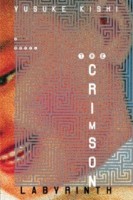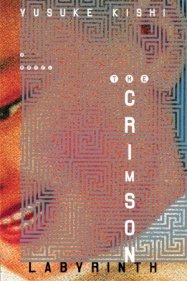 Author: Yusuke Kishi
Author: Yusuke Kishi
Translator: Masami Isetani and Camellia Nieh
U.S. publisher: Vertical
ISBN: 9781932234114
Released: October 2006
Original release: 1999
The Crimson Labyrinth, written by Yusuke Kishi, was first published in Japan in 1999. Prior to the novel’s release, Kishi had won two Japan Horror Association Awards. He continues to be a bestseller and award winner in Japan both for his horror and for his speculative fiction. The Crimson Labyrinth was released in English in 2006 by Vertical with a translation by Masami Isetani and Camellia Nieh. The novel was Kishi’s English debut and so far remains the only work of his that has been translated, although Vertical is scheduled to release Tōru Oikawa’s manga adaptation of Kishi’s novel From the New World in 2013. The Crimson Labyrinth was my introduction to Kishi and his work. I was particularly interested in reading The Crimson Labyrinth after seeing it compared to Koushun Takami’s Battle Royale, a personal favorite of mine. Also, I tend to enjoy just about everything that Vertical publishes.
Forty years old and unemployed, Yoshihiko Fujiki never expected that answering a job advertisement would end up with him being drugged and abandoned in the wild. He wakes up alone with only a small amount of food and water and a Pocket Game Kids handheld game console to keep him company. Soon he encounters Ai Otomo who is also wandering alone and who has been given similar provisions. Following the instructions provided by the game console, together they navigate the labyrinthine corridors and valleys of the bizarre landscape in which they find themselves. When they reach the first checkpoint indicated by the console they discover another group of people waiting there. All together there are nine Japanese men and women and no one seems to be certain of what is going on, where they are, who has stranded them or for what purpose. What they do know is that have become unwilling participants in a perverse game of survival. If they want to stay alive they may very well have to turn on each other.
The Crimson Labyrinth is heavily influenced by extreme reality television as well as classic, text-based role-playing games. And just like those RPGs, the decisions made by the characters early on in The Crimson Labyrinth are the most crucial and will determine how the rest of the game will play out. At first the group of nine works together, but their cooperation quickly disintegrates. The group fragments into four smaller teams, each following a different path outlined by the game: survival, self-defense, food, or information. Game theory might suggest how the competition will progress and what will lead to the ideal outcome for all involved, but as Fujiki points out, game theory is nearly useless in their situation. It depends on people making logical and rational decisions after considering all the information available to them. Humans are most certainly not rational creatures, especially when faced with the unknown, consumed by fear, and fighting for their lives.
Most of The Crimson Labyrinth takes place over the course of a few weeks. As events and the game unfold, the novel is seen exclusively from Fujiki’s perspective. For a large part of The Crimson Labyrinth he doesn’t interact much with anyone except Ai. This is a little unfortunate since the utter hell the other teams are going through can only be inferred. But as the novel and the game progress, Ai and Fujiki come across shocking evidence that the other players are having a very hard time of it and that it didn’t take long at all for violence to erupt. The wilderness is filled with its own dangers, but it’s really their fellow humans that they need to be wary of. Terrible things happen in The Crimson Labyrinth. What makes it even worse is the fact that so many of them could have been avoided if only people were able to bring themselves to trust each other and work together. In the end, no one is entirely innocent of the deaths that occur. A quick read, The Crimson Labyrinth is an absorbing novel of horror and survival.

Leave a Reply